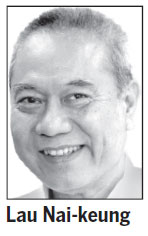History of HK as taught in the 1960s
Updated: 2012-10-23 07:28
By Lau Nai-Keung(HK Edition)
|
|||||||||

There is nothing new about a history of Hong Kong or its being taught in school.
I have on my desk a history textbook Fragrant Habour: A Short History of Hong Kong. This 1962 edition, very likely the first edition, is written by G. B. Endacott and A. Hinton "to provide one term's work at the Form IV level, though some schools might prefer to use it in Form III".
The focus of the book is overwhelmingly administrative, where colonial rule is treated as merely a mechanism through which law and order were instilled to this otherwise uncivilized territory. When the book is re-read decades later today, one question that naturally comes to mind is how "brainwashing" can "colonial historical scholarship" be?
As anyone who has a passing interest in Chinese modern history well remembers, after the First Opium War the Chinese government paid compensation to the British, opening four ports in addition to Hong Kong, at which British subjects could reside and trade. The Chinese government also promised that the tariff should be settled by mutual agreement, and recognized the diplomatic equality of Britain with China. Endacott told readers that the importance of diplomatic equality is "difficult to exaggerate": "The difficulties which had caused the war might have been settled peacefully if China had recognized the principle of diplomatic equality, the idea that nations should discuss difficulties between them as equals. But China had regarded herself - and in view of her history not unnaturally - as superior to all other nations. She could not, therefore, allow other nations to meet her on equal terms."
While we are at a loss why the "principle" of diplomatic equality could have justified a war of aggression for the benefit of trade, to his credit, Endacott promptly admitted in a subsequent paragraph that "perhaps it would be truer to say that any question would still be decided on a basis of inequality, but whereas the power had previously rested in the hands of China, it now lay in the hands of the Western countries."
I believe that Endacott's frankness is attributed both to his integrity and the fact that colonial rule was at that moment hegemonic. In 1962 Endacott could proclaim that "the history of Hong Kong is so short and that so much has happened here in the last 15 years that it is difficult to draw a line between history and civics," and that while his book was intended to be part of the history syllabus, "some schools might wish to use it as part of the civics course."
The British sense of security changed very quickly, as events unfolded in 1967. While I am not sure how the "civics course" has changed over the years, one thing is certain: in the last 20 years, no secondary school students ever lay hands on a book similar to Fragrant Habour, biased as it may be, in his or her history or civic education classes. What they are taught about Hong Kong is that the city has been enjoying freedom, rule of law and separation of power, since nobody knows when.
Historical discourses are embedded in values. They cannot be otherwise. Endacott wrote in defence of British imperialism, but that does not mean that his book is brainwashing, or that we could not benefit from his work. If we cannot agree to a curriculum because of our distrust of the government, I suggest we let our students use the Fragrant Habour as a textbook in school. That would be much better than the current situation of ignorance.
Today, no politically correct historian would write the same way as Endacott did about the colonial government's various campaigns against crime and filthiness. During the wave of de-colonization and neo-colonization in the 1990s, the newly created genre of "the history of Hong Kongers" came to dominate the field. My only comment to this school of thought is that while the study of common people in the history of Hong Kong is long overdue, it should not mislead us into believing that the primary determining forces in the history of Hong Kong were the Chinese people residing in the territory and not the interaction between the British and Chinese governments. If subjectivity is mistaken as agency, we get nothing but ideology.
The author is a member of the Commission on Strategic Development.
(HK Edition 10/23/2012 page3)